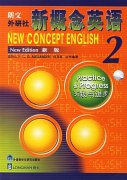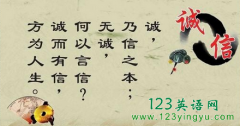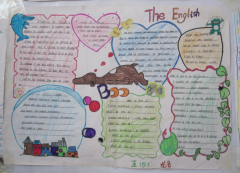英语常用谚语与惯用语(2)
编辑:高中作文网
尽快。
As soon as possible. *缩写是ASAP。
Should I mail this letter to you? (我可以把这封信寄给你吗?)
Yes. As soon as possible. (对,请尽快寄来。) *电话中的对话。
随便吃。
All-you-can-eat.
buffet
smorgasbord
Eat as much as you like.
Eat as much as you wish. *作为句子应为“你想吃多少就吃多少”。
多项选择。
multiple-choice
multiple-choice questions (多项选择题)
各就各位,预备,跑!
Ready, get set, go!
On your mark, get set, go!
从头到尾。
from A to Z. *是开始字母A到最后一个字母Z,即“从开始到最后”、“完全”的意思。
I don't know anything about driving. (我一点也不懂驾驶。)
I'll teach you from A to Z. (我会从头到尾教你的。)
entirely (完全地)
completely (完全地)
始终/一直/一贯
all long *用于“从一开始我就说过吧”等句子中,表示“从开始就……”。
So, she is married. (所以,她结婚了。)
I've been telling you that all along. (我从一开始就告诉你了。)
from the very beginning
all this time
since the start
就我的记忆来说……
As far as I can remember,…
What's John's last name? (约翰姓什么来着?)
As far as I can remember, it begins with M. (就我的记忆来说,它的第一个字母是M。)
To the best of my memory,…
As far as I know,… (就我所知……)
If my memory serves me right,… (如果我没记错的话,……)
以牙还牙,针锋相对。
Tit for tat.
John kicked me, so I gave him tit for tat.(约翰踢我,所以我以牙还牙。)
这是我为什么在这儿的原因。
That's what I'm here for.
What are you studying at Harvard? (你在哈佛大学学什么?)
Economics. That's what I'm here for. (学经济,这就是我为什么在这儿学习的原因。)
2+3等于5。
Two and three is five.
Two plus three is five.
Two and three makes five.
Two and three equals five.
我们有天壤之别。
We're as different as night and day.
We're completely different. (我们俩完全不同。)
We have nothing in common. (我们没有任何共同点。)
东施效颦。(机械模仿。)
M see, m do.
She just bought a new car just like yours. (她也买了一辆跟你一样的车。)
Well, m see, m do. (是嘛,真是东施效颦。)
以先后顺序为准。
First come, first served. *“按到达的先后顺序”、“按报名顺序”,直译是“第一个来的,第一个得到供应”。
Do you take reservations? (你预订了吗?)
No, first come, first served. (没有,先来的先得。)
On a first-come, first-served basis.
过时了。
It's out of date.
Look at my camera. (你看我的照相机。)
But it's out of date already. (可它都过时了。)
It's old-fashioned.
It's outdated.
It's behind the times.
电视有长处,也有短处。
TV has its merits and demerits.
TV has its good and bad points.
There are good and bad points about TV.
我利用了他的弱点。
I took advantage of his weakness. *take advantage of…“利用……”。
我长了不少见识。
I've learned something.
The TV show was interesting. (那个电视节目很有意思。)
Yeah, and I've learned something. (是呀,我长了不少见识。)
I've learned something new. (我学到了一些新东西。)
那会引起火灾呀!
It's a fire hazard. *hazard表示“人力无法躲避的危险”。
Look at John's toy! (快看约翰的玩具。)
It's a fire hazard. (那会引起火灾呀!)
It could catch on fire easily. (这很容易着火。)
It could cause a fire.
什么事都有可能发生。
Anything could happen.
There's no knowing what may happen.
You never know. (任何事情都是很难预料的。)
Anything's possible.
It could happen to you. (对你来说什么都有可能发生。)
将来可以用来作参考。
for future reference
You should keep the book for future reference. (你该把这本书收好,以便将来作为参考。)
在我背后。
behind my back *意为“在我听不到的地方”、“看不到的地方”,用于当人们四处活动,偷偷摸摸地说一些坏话时。
Everyone is laughing at me behind my back. (大家都在背后笑话我。)
How do you know? (你怎么知道的?)
secretly (秘密地)
in my absence (在我不在的时候。)
without my knowledge (背着我)
换换心情。
for a change *“偶尔地”、“换心情”、“追求变化”、“变化一下”、“别开生面的”、“下次”等情况时用。
Let's take a walk for a change. (我们去散散步换换心情吧。)
Okay, let's. (好吧,走。)
instead (别这样!)
有钱能使鬼推磨。
Money talks. *金钱是给与势力和权力的东西。表示金钱的力量非常大。
Jane married a millionaire. (简和一个大富翁结婚了。)
Money talks. (真是有钱能使鬼推磨。)
Money talks, bullshit walks. 比较随便的说法。
别说丧气话。
Never say die. *直译“绝不言死”。无论遇到什么情况也不能绝望,始终要尽最大的努力,坚定信心抱有希望地坚持下去的意思。
过去的事情让它过去吧。
Let bygones be bygones. *表示“过去的事情就让流水冲走吧”、“过去的事情再责备也不管用了”。
有总比没有强。
Better than nothing. *东西也许不多,不那么充分,但总比一点儿没有强。
酒肉朋友。
A fair-weather friend. *直译是“好天气下的朋友”、“顺利时才与你交往的朋友”。与“A friend in need is a friend indeed”(患难之交见真情)正好相反。
滴水汇成河。
Every little bit helps. *无论多么小的善行,其行为都是宝贵的,无论多么小的事情,只要汇集在一起,都能起到大的作用。








